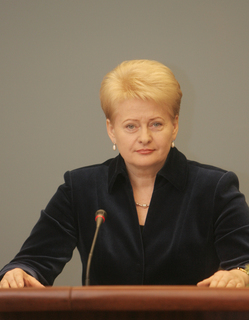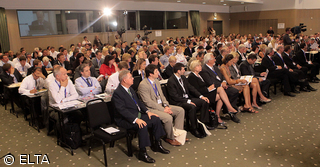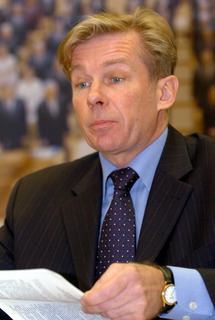The Georgian government and the International Monetary Fund remain at odds over ways to close the Caucasus country’s widening budget deficit, and over other measures to improve economic policy
Published:
20 July 2003 y., Sunday
The IMF has given Georgian officials until mid August to implement reforms in several specified areas. At stake for Tbilisi is not only direct IMF assistance, but also the Georgian government’s ability to reschedule its Paris Club debt.
An IMF delegation wrapped up a fact-finding mission to Georgia on July 7. At the conclusion of the visit, IMF representatives issued a memorandum stating that its ability to complete a final review of a nearly three-year-old Poverty Reduction and Growth Facility (PRGF) was dependent on the Georgian government’s willingness to carry out targeted reforms. The IMF set August 15 as the deadline for Tbilisi for reforms, including: trimming roughly 100 million lari (about $47 million) from the state budget; improving tax collection while simplifying the tax code; raising energy tariffs; and settling arrears to the state pension system.
If Georgia is unable to implement the changes, the IMF is likely to withhold the final tranche of a $31 million loan under the PRGF. Of far greater importance for Georgia, the IMF has threatened to withdraw its support for Tbilisi’s efforts to get its Paris Club debt rescheduled. Talks between Georgia and the Paris Club of creditor nations are scheduled to occur in September. If Tbilisi is unable to reschedule the debt, it faces a potentially budget-busting $50 million payment by the end of 2003.
"We’ve been trying to complete this [PRGF] review since November," IMF Resident Representative to Georgia Jonathan Dunn told EurasiaNet. However, Dunn stressed that the IMF "has left the door cracked open" for Georgia to make the demanded policy changes.
The IMF stance creates a quandary for Georgia’s government, as parliamentary elections loom in November. [For background see the Eurasia Insight archives]. Implementation of the IMF-mandated reforms could stir popular dissatisfaction, possibly costing President Eduard Shevardnadze supporters at the polls in November. Conversely, inaction by the government, especially concerning the Paris Club debt rescheduling, could create an even bigger public backlash. Either way, Georgia seems to be facing its last opportunity to implement reforms and avoid severe fiscal strain, possibly even default.
Šaltinis:
eurasianet.org
Copying, publishing, announcing any information from the News.lt portal without written permission of News.lt editorial office is prohibited.
The most popular articles
 A specific EU budget line for the new EU stabilisation mechanism should be created as soon as possible, to ensure its credibility, Council, Commission and Parliament negotiators agreed at a three-way meeting on Wednesday.
more »
A specific EU budget line for the new EU stabilisation mechanism should be created as soon as possible, to ensure its credibility, Council, Commission and Parliament negotiators agreed at a three-way meeting on Wednesday.
more »
 New EU rule will help phone-users avoid astronomical bills for web-surfing and downloads abroad.
more »
New EU rule will help phone-users avoid astronomical bills for web-surfing and downloads abroad.
more »
 The Communication approved today by the Commission builds on the principles presented on 12 May to reinforce the economic governance in the European Union.
more »
The Communication approved today by the Commission builds on the principles presented on 12 May to reinforce the economic governance in the European Union.
more »
 Eurostat report just published shows that the crisis has brought some lower taxes.
more »
Eurostat report just published shows that the crisis has brought some lower taxes.
more »
 New legislation is needed to ensure fair returns to farmers and transparent prices to consumers, by enforcing fair competition throughout the food supply chain, said Agriculture Committee MEPs on Monday.
more »
New legislation is needed to ensure fair returns to farmers and transparent prices to consumers, by enforcing fair competition throughout the food supply chain, said Agriculture Committee MEPs on Monday.
more »
 Fish imports play a crucial role in supplying the European market, yet fisheries and aquaculture are strategic sectors that do not lend themselves to a purely free-trade approach, believes the EP Fisheries Committee.
more »
Fish imports play a crucial role in supplying the European market, yet fisheries and aquaculture are strategic sectors that do not lend themselves to a purely free-trade approach, believes the EP Fisheries Committee.
more »
 I will support every proposal that strengthens cooperation among the European Union's Member States and serves Lithuania's interests," President of the Republic of Lithuania Dalia Grybauskaitė said at the meeting with EU Member States' ambassadors resident in Lithuania.
more »
I will support every proposal that strengthens cooperation among the European Union's Member States and serves Lithuania's interests," President of the Republic of Lithuania Dalia Grybauskaitė said at the meeting with EU Member States' ambassadors resident in Lithuania.
more »
 The fourth World Lithuanian Economic Forum “High tech innovation & investment: local to global” will start in London on 22 June.
more »
The fourth World Lithuanian Economic Forum “High tech innovation & investment: local to global” will start in London on 22 June.
more »
 Lithuania aims for the five Nordic countries and three Baltic States to become single community of values, which would be linked by a versatile quality of democracy, security and everyday life.
more »
Lithuania aims for the five Nordic countries and three Baltic States to become single community of values, which would be linked by a versatile quality of democracy, security and everyday life.
more »
 MEPs decided on Wednesday to create a special committee to prepare for the EU's next long-term budgetary framework.
more »
MEPs decided on Wednesday to create a special committee to prepare for the EU's next long-term budgetary framework.
more »